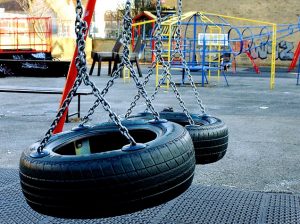Religious Freedom Or Religious Preference? Neil Gorsuch Will Decide Next Week
The GOP didn't get Gorsuch on the Court so he could rule against them.

(Photo by John Li/Getty Images)
Next week, the Supreme Court will hear a case that they’ve been putting off since October Term 2016. Neil Gorsuch, who was sworn in today, will likely cast the deciding vote on a divided Court.
The case is Trinity Lutheran Church of Columbia, Inc. v. Comer. When you see media reports referring to Trinity Lutheran as a “religious freedom” case, know that those reports are accepting the Republican theory of the case. If you are more progressive, Trinity Lutheran sounds like a religious “establishment” case. Either way, the case in controversial because it hits a pressure point on the religious divide in this country.

Legal AI: 3 Steps Law Firms Should Take Now
The state of Missouri has a program that reimburses non-profit organizations that resurface playgrounds with rubber surfaces made from used tires. The program is paid for by a state sales surcharge on new tire purchases. Missouri gets fewer tires in its landfills, the children of Missouri get a safe surface to play on, everybody wins.
The program does not extend to religious non-profits, because Missouri (and a whole bunch of states) have rules that state funds can’t go to religious institutions. Trinity Lutheran applied for the program, but was denied funds.
Trinity Lutheran sued, arguing free exercise of religion under the First Amendment and equal protection under the Fourteenth Amendment. Federal courts ruled for the state and against the school.
You see the problem here: Trinity Lutheran believes it is being denied funding because of its religious affiliation. Missouri believes redirecting state funds towards a religious institution would be subsidizing religion in the state.
Sponsored

The Business Case For AI At Your Law Firm


Navigating Financial Success by Avoiding Common Pitfalls and Maximizing Firm Performance

Is The Future Of Law Distributed? Lessons From The Tech Adoption Curve

The Business Case For AI At Your Law Firm

It’s an important question. Religious institutions all across the country would like access to state funds. Meanwhile, state budgets are strapped and giving religious schools money not only violates establishment of religion principles — I’m Catholic, why should my new tire sales tax go to the Lutherans? — it also means that less funding will be available for secular institutions. For instance, two-thirds of schools that applied to Missouri used-tire playground programs were denied state funding. There simply isn’t enough money to go around for everybody.
I’d like to see how the “free exercise” crowd would decide the case of Sunni Madrassa v. Goodyear et. Firestone. But that’s a different issue.
The Supreme Court agreed to hear this case while Antonin Scalia was still alive. They’ve been kicking it down the calendar ever since he passed away. Most likely, the Court is sharply divided on this issue.
Enter Neil Gorsuch. I don’t think anybody on the secular side of the fence thinks the state of Missouri is going to get a fair shake from Mr. Hobby Lobby.
Adam Feldman at Empirical SCOTUS has looked at Gorsuch’s record and has an idea on where he might be leaning.
Sponsored

Early Adopters Of Legal AI Gaining Competitive Edge In Marketplace

Legal AI: 3 Steps Law Firms Should Take Now
This case has the potential to split the Justices across ideological lines. If this is the case, Gorsuch could play a pivotal role. His previous decisions tend to move against findings of Establishment Clause violations. If the Justices split and Gorsuch votes accordingly we may see a 5-4 decision in this case (if this happens and Chief Justce Roberts assigns the majority opinion to Gorsuch this may be quite an important opinion for him early in his Supreme Court tenure).
Trinity Lutheran is exactly the kind of case that justifies, in the mind of a Republican, refusing to give Merrick Garland a hearing, and destroying the filibuster to install Gorsuch on the Court. This case represents a wealth transfer from state coffers to religious institutions. It’s exactly the kind of thing cultural conservatives get up for.
I expect Gorsuch, like Scalia before him, to deliver for his people on this issue. As professor Rick Hasen notes, we now explicitly have a “Republican Supreme Court.” This is a case where that will matter.
It won’t be the last.
How Will Gorsuch Decide on Cases from the Supreme Court’s April Calendar? [Empirical SCOTUS]
The Republican Supreme Court [Election Law Blog]
Elie Mystal is an editor of Above the Law and the Legal Editor for More Perfect. He can be reached @ElieNYC on Twitter, or at elie@abovethelaw.com. He will resist.







